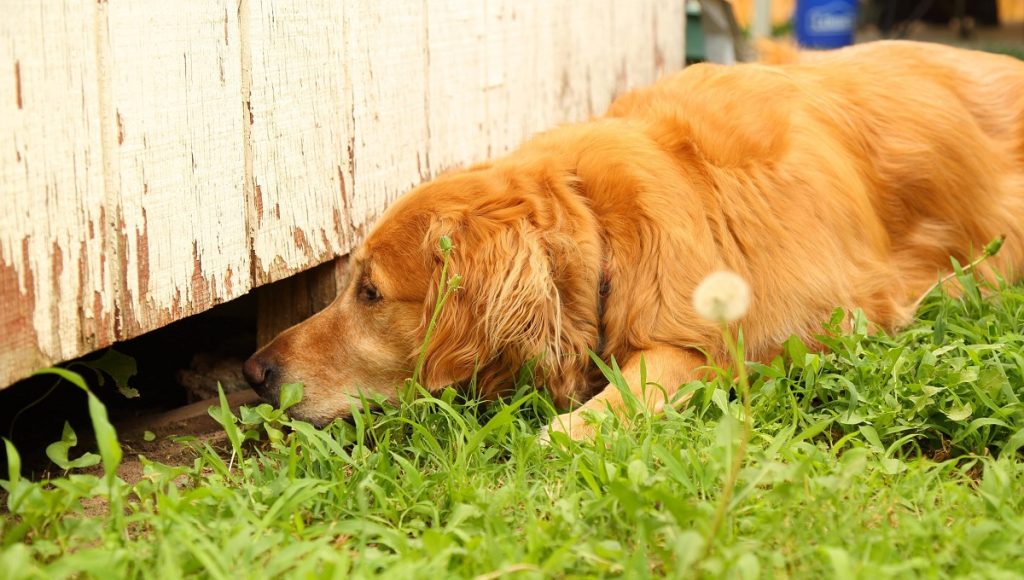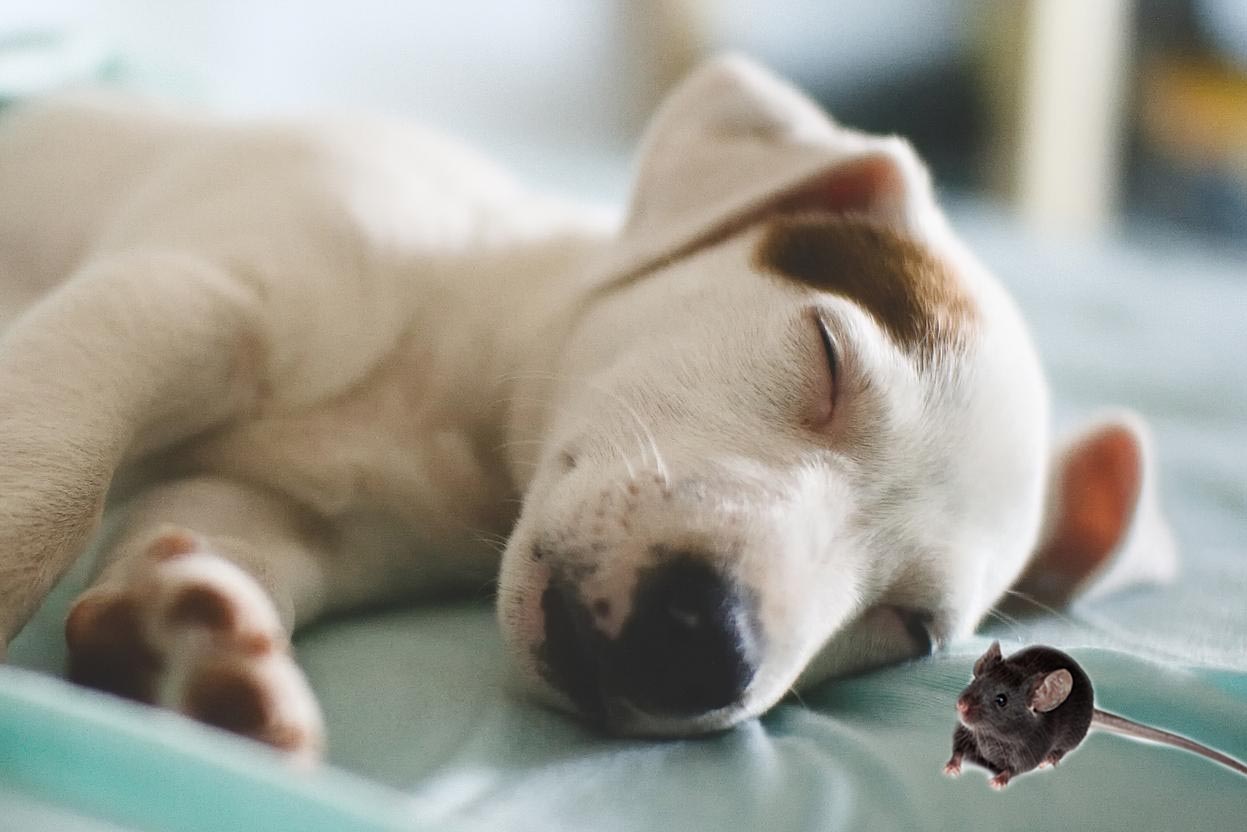Rats often exhibit a strong aversion to dogs due to the perceived threat posed by their larger and predatory nature. Rats are naturally cautious and tend to avoid areas where dogs are present.
However, the extent to which rats are scared of dogs can vary depending on the individual rat’s behavior, as well as the specific circumstances and the dog’s demeanor.
While dogs can be effective in deterring rats from a property, it’s important for dog owners to take precautions to prevent potential encounters, as interactions between rats and dogs can lead to confrontations, bites, or the transmission of diseases and parasites.

Will a Rat Fight a Dog?
Rats typically try to avoid confrontations with dogs because dogs are much larger and can be seen as potential predators by rats. Rats are more likely to flee or hide when they encounter a dog rather than engage in a fight. Rats are naturally cautious and will try to stay out of a dog’s reach to protect themselves.
However, while it’s not common, there may be instances where a rat feels cornered, threatened, or is defending its nest, and it might bite or lash out at a dog. These interactions are generally infrequent, and the risk of physical harm to a dog from a rat is relatively low.
It’s essential for dog owners to take precautions to prevent encounters between their dogs and rats to avoid potential confrontations, bites, or the transmission of diseases or parasites that rats may carry.
Can Dogs Sense Rats?
Yes, dogs have an acute sense of smell and are capable of sensing the presence of rats. Rats, like many other animals, have distinct scents that dogs can detect. Dogs have been used for centuries as working animals to help control rat populations.
They can use their sense of smell to locate and track rats, even if the rats are hidden from view. Dogs can often detect the presence of rats through their scent, and their behavior may change when they sense rats nearby.
They might become alert, exhibit heightened interest in a specific area, or even try to chase or catch the rats. It’s important to note that while dogs can sense rats, not all dogs have the same level of prey drive, and some may be more effective at rat detection than others.
Dog breeds that were originally bred for hunting, such as terriers, may have a particularly strong instinct to hunt and catch small animals like rats.
Will a Rat Go Near a Dog?
Rats generally try to avoid dogs because dogs are perceived as potential predators by rats. Rats are naturally cautious and tend to stay away from larger animals that may pose a threat to them. While individual rat behavior can vary, it’s more common for rats to avoid areas where dogs are present.
There are circumstances where rats might venture near dogs, especially if they are drawn by a source of food, water, or shelter. The presence of a dog may not deter rats from approaching, but it’s less likely that they will come into direct contact with a dog, as they usually try to keep a safe distance to protect themselves.
To deter rats from coming near your property, it’s important to keep it clean and free from potential attractants like food scraps or accessible trash. Additionally, dogs can act as a deterrent to rats, as their presence can make rats less likely to approach an area.
Are Rodents Scared of Dogs?
In general, rodents, such as rats and mice, are often cautious and have an aversion to dogs. Dogs are larger and perceived as potential predators by rodents, which makes rodents naturally wary of them. The scent and presence of a dog can be enough to deter rodents from venturing into areas where dogs are present.
While rodents may be more active during the night when dogs are typically indoors, they tend to avoid areas where they sense the presence of dogs, which they perceive as a threat. This avoidance behavior is an evolutionary survival strategy for rodents, as it helps protect them from potential predation.
However, it’s important to note that the extent to which rodents are scared of dogs can vary depending on the individual rodent’s behavior and the specific circumstances.
While dogs can be effective deterrents for rodents, it’s still important to take steps to prevent rodent infestations and keep your property clean and well-maintained to discourage rodents from finding sources of food, water, or shelter.

Does Dog Urine Attract Rats?
Dog urine can potentially attract rodents, including rats, due to its scent and the presence of ammonia. Rodents have a strong sense of smell, and they may be attracted to the scent of dog urine, particularly if they perceive it as a potential food source or mark of territory.
Additionally, the ammonia content in urine can be appealing to rodents, as it may resemble the scent of other animals or food. To minimize the attraction of rodents to your property, especially if you have a dog, it’s important to clean up dog urine promptly and maintain good hygiene practices.
Additionally, ensuring that food and trash are properly stored and that there are no other attractants for rodents can help prevent rodent infestations.
Can Rats Smell Dogs?
Rats are able to smell dogs, as well as other animals. This ability is due to the rats’ keen sense of smell. Rats have a highly developed olfactory system, which allows them to identify various smells.
The olfactory system is composed of the nose and the brain. The nose contains millions of receptors that send information to the brain. The brain then processes this information and determines what the rat is smelling.
Are Rats Scared of Dogs in The House?
Rats may still exhibit avoidance behavior and fear when they sense the presence of dogs inside a house, but their reactions can vary. Rats are naturally cautious and perceive dogs as potential predators, which makes them wary of areas where dogs are present.
However, the extent of their fear may depend on several factors, including the size and breed of the dog, the behavior of the dog, and the specific circumstances.
It’s not uncommon for rats to avoid areas of the house where dogs are active, but they may still seek shelter in less frequented or hidden areas. To prevent rat infestations, it’s essential to maintain good hygiene practices, seal off any potential entry points for rats, and keep food sources securely stored.
If you suspect a rat infestation in your house, it’s advisable to take steps to address the issue promptly, such as contacting pest control professionals.
Conclusion
Rats are generally cautious and have an aversion to dogs due to the perceived threat posed by dogs’ larger size and predatory nature.
While individual rat behavior may vary, dogs often act as effective deterrents to rats, discouraging rodents from venturing into areas where dogs are present. The natural fear that rats have of dogs is an evolutionary survival strategy.
However, to minimize the risk of rodent infestations, it’s crucial for dog owners to maintain good hygiene practices, clean up after their dogs, and take steps to prevent rodent access to food, water, and shelter.